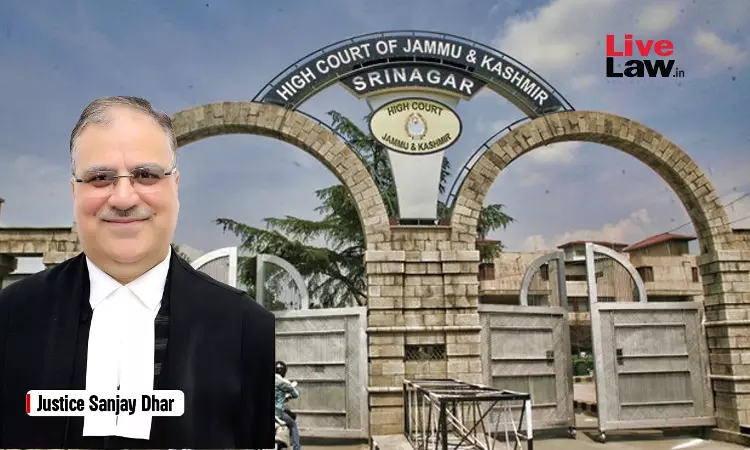- Home
- /
- High Courts
- /
- High Court of J & K and Ladakh
- /
- Interim Directions Under Order 39...
Interim Directions Under Order 39 Rule I & II Of CPC Cannot Be Passed Against Non-Parties: J&K High Court
LIVELAW NEWS NETWORK
26 May 2025 10:00 AM IST
Reinforcing procedural rigour in civil litigation, the High Court of Jammu and Kashmir and Ladakh has ruled that interim directions under Order 39 Rules 1 and 2 of the Civil Procedure Code (CPC) cannot be passed against a person who is not a party to the suit or appeal.“.. there can be no justification for grant of an interim injunction in respect of a claim which is not even projected by...
Reinforcing procedural rigour in civil litigation, the High Court of Jammu and Kashmir and Ladakh has ruled that interim directions under Order 39 Rules 1 and 2 of the Civil Procedure Code (CPC) cannot be passed against a person who is not a party to the suit or appeal.
“.. there can be no justification for grant of an interim injunction in respect of a claim which is not even projected by a person before the court in a particular proceeding. It is not the scope of Order 39 Rule 1 and 2 CPC to pass interim directions against a person who is not a party to the suit or the appeal”, Justice Sanjay Dhar observed.
The court made this observation while dismissing an appeal filed by one Mohammad Shaban Ganai, thereby upholding the decision of the Principal District Judge, Budgam.
The dispute arose from a piece of land, originally owned by one Mst. Farzi. She sold this land to Mohammad Abdullah Sheikh, but her co-sharers, Mohammad Shaban Ganai and another (the appellants), filed a preemption suit claiming the right to purchase the land before any outsider. The Sub Judge, Budgam, ruled in their favour on 19 February 2007, directing the delivery of possession to them.
However, before this judgment could be executed, the land was sold again this time to Mushtaq Ahmad Rather (the respondent) through a sale deed dated 5 October 2007. He took possession and filed a civil suit challenging the earlier decree and asserting his own ownership. His suit was later dismissed by the High Court, but he was given the liberty to file a separate claim before the Executing Court.
Meanwhile, the original buyer, Mohammad Abdullah Sheikh, filed an appeal against the 2007 judgment, accompanied by a plea to condone the delay. During the pendency of that appeal, the appellants filed an application seeking an injunction to stop Mushtaq Ahmad Rather from raising any construction on the land.
Crucially, Mushtaq was not a party to the appeal. He opposed the injunction, claiming that he had been in possession of the land for over 13 years under a valid sale deed, and that his rights could not be curtailed in a case to which he was not a party.
The District Judge dismissed the injunction application on two grounds: first, that an interim injunction could not be passed against a non-party to the suit; and second, that the appellants failed to demonstrate any irreparable loss warranting such relief. The court also noted that the respondent had been in settled possession for over thirteen years and that his sale deed stood intact.
Challenging this dismissal before the High Court, the appellants argued that the respondent was a transferee pendente lite and thus bound by the decree, relying on the Supreme Court's ruling in Usha Sinha v. Dina Ram & Ors. They contended that the doctrine of lis pendens bound the respondent to the outcome of the original suit and equated his status to that of the judgment debtor.
Justice Sanjay Dhar, while not disputing the doctrine of lis pendens, emphasized a distinct procedural limitation and observed,
“It is not the scope of Order 39 Rule 1 and 2 CPC to pass interim directions against a person who is not a party to the suit or the appeal.”
Analyzing the statutory provisions, the Court highlighted that temporary injunctions under Order 39 CPC are aimed at parties to the proceedings. Injunctions can only be issued where the suit property is under threat of being wasted, alienated, or damaged by parties involved in the litigation, the court said and added that the provisions do not extend to individuals who have not submitted themselves to the jurisdiction of the court in the relevant proceedings.
Justice Dhar noted that an interim injunction is granted to preserve the status quo between parties and to protect rights that are actively being adjudicated. He added,
“A person who is not a party to the proceedings obviously has not put forward his claim with regard to the suit property before the court. Thus, there is nothing to be investigated in respect of the claim that such person may have with regard to the suit property”
The Court held that while the appellants may have a decree in their favour, the correct legal remedy against the respondent would be to institute a separate suit for injunction and seek interim relief therein, where the respondent is made a party and has the opportunity to present his case.
Finding no legal infirmity in the District Judge's reasoning, the High Court dismissed the appeal as meritless.
Case Title: MOHAMMAD SHABAN GANAI & ANR Vs MUSHTAQ AHMAD RATHER
Citation: 2025 LiveLaw (JKL) 201



